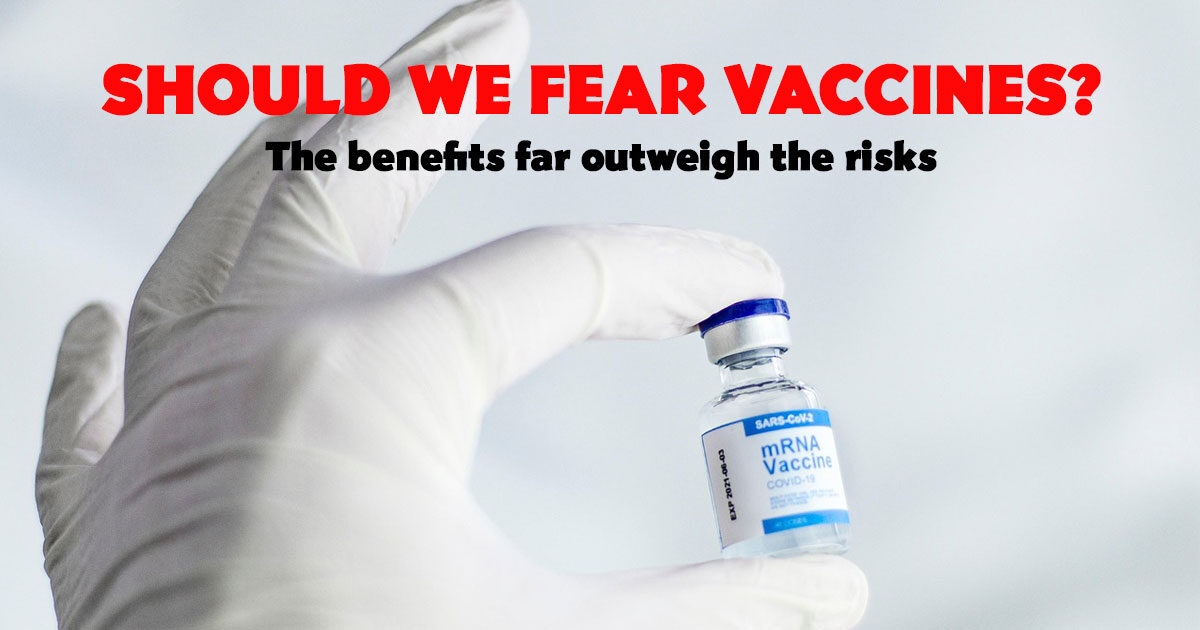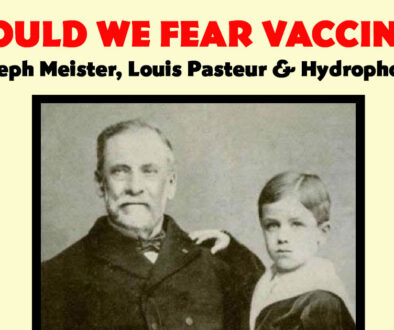Should We Fear Vaccines? The benefits far outweigh the risks
by Jack Hoehn | 6 August 2025 |
In 1885, nine-year-old Joseph Meister was the first human ever to survive rabies—then called hydrophobia—as a human experiment of a primitive vaccine. As with modern vaccines, French scientist Louis Pasteur first tested the vaccine on animals—rabbits, then dogs. A few dogs had survived both rabies and the vaccine before Pasteur tried it on little Joseph.

During the subsequent 145 years many new vaccines have been developed, tested first on animals and then on humans.
Smallpox, thanks to worldwide vaccination campaigns, has completely disappeared. Since all dogs in the United States must be vaccinated against rabies, and people exposed to animals can be vaccinated with better, safer vaccines, it is now very rare in this country for anyone to die from the rabies virus.
But recently increasing numbers of people have become fearful not of rabies, but of vaccines. Although anti-vaccination is not part of the Ellen White-initiated health message, in some Adventist communities it has become bundled with vegetarianism, hydrotherapy, and the avoidance of or toxic drugs, tobacco, alcohol, pepper, ketchup or mustard, as part of the Adventist “healthy lifestyle.”
Vaccine-phobia appears to have replaced the 19th-century fear of hydrophobia.
Vaccines are a blessing
I was born and educated in the 20th century but for 13 years, as a mission doctor, I practiced medicine in environments similar to the 19th-century mostly-vaccine-free world of Ellen White. I saw children of unvaccinated mothers die of tetanus (“lockjaw”) in their belly buttons. I saw unvaccinated children die of measles. I saw a pretty mother in her twenties die of chickenpox. I saw huge swollen tonsils and inability to swallow even saliva—not from hydrophobia, but from diphtheria.
My own father at 36 years of age spent months in an iron lung, unable to breathe on his own, and for the rest of his adult life used a wheelchair because of the paralysis caused by the polio virus. This was, of course, before either the Salk or Sabin anti-polio vaccines were available.
I want you to understand that I am completely in favor of vaccinations against all possible illnesses. I not only don’t want to be sick, I also don’t want to die even if I do get sick. I and my children and grandchildren have all been vaccinated against smallpox, yellow fever, cholera, diphtheria, tetanus, whooping cough (pertussis) (DTaP), typhoid, measles, mumps, rubella (MMR), Hib (Haemophilus influenzae type b), chickenpox, meningitis, polio, shingles, Hepatitis A, Hepatitis B, RSV (Respiratory Syncytial Virus), flu shots, plus all Covid19 shots and boosters. If I had a daughter, I would want to protect her against cancer of the cervix with Gardasil-9.
This conviction is not political. As a doctor I believed this when I considered myself politically an independent or a Republican. And I still believe this now when I don’t. I own no pharmaceutical stocks and have never had a kickback payment from anyone for promoting or using vaccines of any kind.
But if you have been told that vaccines either don’t work or, worse, are dangerous—especially to your children—then let’s see if you and I can find some common ground.
Yes there are some problems with vaccines. But let me again make this clear: in each case the risks are small compared to the benefits of not getting sick or not dying from the illness.
• Some vaccines don’t work perfectly to prevent illness. We all have had flu shots, and then that year got a bad flu. Many of us had Covid19 shots and still came down with Covid. Older cholera vaccines don’t work very well, although newer ones might. You can still get a milder case of shingles after Zostavax, although Shingrix is much better.
But we all need to remember when we are told by some unhappy person, “I took that vaccine and it didn’t work, I had a terrible case of –flu, covid, measles, etc.”—that that person is still alive to complain. Some vaccines don’t fully prevent illnesses, but all approved vaccines have been statistically proven to reduce illness. Even more important: they reduce fatalities from those illnesses.
• Vaccines can have side effects. I have had sore arms, a day of fever, a headache, and seen mild injection site infections in patients. There are even a few worse things that happen. Guillain-Barre Syndrome (GBS) is a kind of polio-like paralysis that can be triggered by the immune system responding to a vaccine. But most GBS happens not from vaccines, but from the illnesses the vaccine was for. GBS most often comes from having influenza, though flu shots trigger 1 or 2 cases per million flu shots.
Covid19 vaccines in young males rarely (22 to 50 cases per 100,000 shots) trigger an increase of inflammation of heart, or pericarditis (myocarditis/pericarditis), within 7 days of the vaccination. Most vaccine-caused myocarditis/pericarditis is mild and resolves quickly. Cases of myocarditis/pericarditis are 7 to 9 times more frequent after Covid19 infection than after 2 doses of vaccine. Myocarditis triggered by the disease is much more serious or fatal than the milder vaccine-related cases. Both the World Health Organization and the American Communicable Disease Center still advise that even for children and young males, the benefits of COVID-19 vaccination—preventing severe illness, hospitalization, and death—far outweigh the rare case of vaccine-associated myocarditis.
None of the risk of side effects for younger males apply to females, especially pregnant ones or anyone under 6 months or over 50 years of age—all who are at the highest risk of getting very sick or dying from Covid infection when not vaccinated.
• Drug companies are making huge profits. It is true that pharmaceutical companies make a lot of money. Drugs cost more in the United States, with little or no governmental regulation, than in almost all the other advanced countries of the world—most of which have government-provided health insurance and regulate drug costs. But it is also true that making and proving vaccines that are both safe and effective is very expensive. So it’s not just about money.
The Trump-1-era rapid production of Covid19 RNA vaccines finally slowing the death rates was a miracle of governmental and pharmaceutical cooperation. In the end it made huge profits for the successful vaccine makers and the Paxlovid drug. But before these vaccines or Paxlovid, 41% of Covid-19 patients sick enough to be admitted to the ICU died!
Do you remember cities hauling in refrigerated trucks to store bodies stacked up far beyond any cities’ morgue capacity to store them? So although as expensive as some of our military expenditures for missiles, bombers, and submarines, the vaccines were still a miracle that President Trump could be rightly proud of. And those of us who got Covid even after our vaccination need to remember that we were not in those refrigerated trucks awaiting burial.
The government that rightly socialized the response to the epidemic (free vaccines and free drugs paid for by taxes) did careful follow-up studies to be sure they were getting their money’s worth. No vaccine has been more intensively studied than the Covid19 vaccines, so although there were huge costs and huge profits, there were also huge benefits. The data speaks not to a “cover up” but to this fact: though the Covid19 vaccines and expensive drugs didn’t stop the illness, they overwhelmingly stopped the deaths.
• “It’s all politics.” It is hard to deny that decisions about who can afford health insurance, who gets Medicare, who gets Medicaid, how much the United States will share modern health care with poorer countries of the world, how we preserve clean air, pure water, and healthy food are all political questions. That’s especially true when it comes to how we pay for it. So let’s agree: there’s lots of politics going on.
For Adventists there should be politics-free zones and politics-free issues, and freedom not only to take vaccines or not take vaccines, or to take or not take birth control, or to permit or not permit abortions—these decisions should not be Republican-vs.-woke fights. They should be fact-based, not fear-based or conspiracy-based decisions.
• And there’s this: when you, a Christian who cares about others’ health, take a vaccine, you contribute to others not getting diseases from you.
In this short article I probably won’t change any minds, so I’ll just state some conclusions without proving them. If you still think it is all politics and profit, then thank you for at least reading this:
-
- Childhood vaccines do not cause autism. It may be plastics, chemicals, pesticides, air pollution, some prescription drugs, or television screens, etc. It is not caused by protecting your children from measles, mumps, or rubella or the other terrible diseases they need never face if we love our children enough to take the very small risks of serious side effects against the very great lifelong benefit of freedom from awful diseases our ancestors lived with, or died terrible deaths from, by giving them approved and tested vaccines.
- People who highly value their own opinions over serious experts, and careful studies can gather groups around them who enjoy being “in the know” and claim to be smarter than everyone else—especially smarter than “those so-called experts.” Might we Adventists, who feel we know more than the majority which day to worship on, be especially at extra risk of this? Just remember: some experts are considered expert because they really do know more than you and I do.
- Free advice. Listening to radical politicians (the best example I’ve seen would be Marjorie Taylor Greene) or physicians (like those who self-title themselves “America’s Frontline Doctors” and sell you things) instead of career public servants such as now-retired Dr. Fauci (who was selling nothing except the best information he could find) is not something Jesus would recommend to Adventists wanting to keep healthy and alive waiting for his soon return.
________________________
 Author Jack Hoehn is known to his patients as Dr. John B. Hoehn, MD (Loma Linda University). His family practice residency was at the University of Calgary Foothills Hospital. He is a boarded Certificant of the Canadian College of Family Physicians (CCFP), and has a Diploma in Tropical Medicine and Hygiene from the Royal College of Surgeons (DTM&H-London). He was a physician and surgeon at mission hospitals in Lesotho and Zambia for 13 years. He practiced in Walla Walla, Washington, as a family physician until retirement. Life Member of the American Academy of Family Physicians. Jack’s book Adventist Tomorrow is a best seller for Adventist Today, available in print or Kindle at Amazon.com.
Author Jack Hoehn is known to his patients as Dr. John B. Hoehn, MD (Loma Linda University). His family practice residency was at the University of Calgary Foothills Hospital. He is a boarded Certificant of the Canadian College of Family Physicians (CCFP), and has a Diploma in Tropical Medicine and Hygiene from the Royal College of Surgeons (DTM&H-London). He was a physician and surgeon at mission hospitals in Lesotho and Zambia for 13 years. He practiced in Walla Walla, Washington, as a family physician until retirement. Life Member of the American Academy of Family Physicians. Jack’s book Adventist Tomorrow is a best seller for Adventist Today, available in print or Kindle at Amazon.com.




